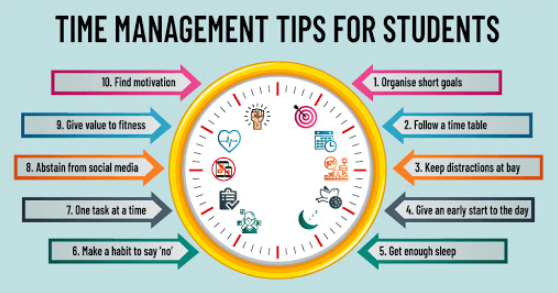
As a college student, you may work part-time to support yourself financially, gain experience, or build your resume. So, juggling work and studies can be demanding. Without proper Time Management, it’s easy to feel overwhelmed by the demands of schoolwork and job responsibilities. Fortunately, you can successfully balance both aspects of your life with some planning and organization. Here are some practical time management tips to help you effectively manage your studies and job.
Create a Schedule
One of the best ways to manage your time effectively is to create a detailed schedule. This will help you visualize your daily commitments and make it easier to prioritize tasks. List your classes, study sessions, work shifts, and other personal commitments. Block out time for essential activities like meals, exercise, and sleep. A well-planned schedule can help you avoid last-minute stress and stay on track with your studies and job.
Prioritize Your Tasks
Not every task is equally essential when balancing school and a job. Learn how to prioritize by identifying which tasks are most urgent or important. For example, studying for an upcoming exam might take priority over a shift at work or a non-urgent assignment. Use tools like to-do lists or apps that help you organize your tasks by deadlines and importance. By focusing on what needs to be done first, you can avoid feeling overwhelmed and stay on top of your responsibilities.
Use Time Between Classes Wisely
In college, there are often gaps between classes. Instead of wasting this time, try to use it productively. You can study, complete assignments, or prepare for your upcoming work shift. Carry study materials with you to review notes or read during these breaks. If you have a flexible job, consider arranging your work schedule to fit these gaps, making the most of your free time on campus.
Set Realistic Expectations
It’s essential to be realistic about what you can handle. While taking on a heavy class load or working extra hours to earn more money may be tempting, it’s crucial to recognize your limits. Taking on too much can lead to burnout, stress, and poor performance in both areas. Be honest about how many hours you can work without sacrificing your academic success. If you’re struggling, please speak with your employer or academic advisor about adjusting your schedule.
Take Breaks and Rest
Balancing work and studies can be exhausting, so taking and taking regular breaks is essentializing yourself by scheduling time for relaxation and self-care. Whether taking a walk, chatting with friends, or practicing mindfulness, taking breaks helps refresh your mind and body. Getting enough sleep is also essential for productivity and concentration. Don’t sacrifice your well-being in the name of being busy—rest is necessary for maintaining physical and mental health.
Communicate with Your Employer and Professors
Effective communication is key to managing both work and school. Be sure to inform your employer about your class schedule and any academic commitments affecting your work hours. Many employers can accommodate students’ needs and may be flexible with their shifts. Similarly, let your professors know if your job occasionally conflicts with class activities or deadlines. Most professors will appreciate your honesty and may offer extensions or alternative solutions when necessary.

Conclusion
Balancing studies and a job as a student can be challenging, but with proper time management, it is entirely achievable. Creating a precise schedule, prioritizing tasks, and being realistic about your workload can ensure you stay on top of your responsibilities. Remember to take breaks, rest, and communicate with your employer and professors to ensure a healthy work-life balance. With these strategies, you’ll be able to manage your time effectively, excel in both your academics and job, and enjoy a more stress-free college experience.




